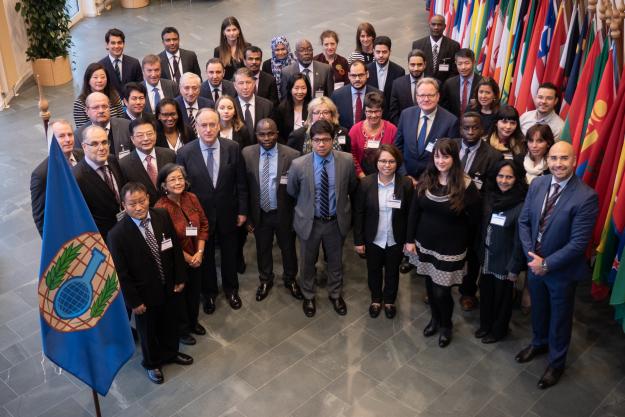
THE HAGUE, Netherlands — 26 October 2018 — In a bid to strengthen international security through development, the Member States of the Organisation for the Prohibition of Chemical Weapons (OPCW) identified activities to help achieve the United Nation’s (UN) Sustainable Development Goals (SDGs) during the third edition of the Forum on the Peaceful Uses of Chemistry, held at the OPCW Headquarters in The Hague on 23 October.
While opening the event, “Potential Contribution of the OPCW to the Achievement of the United Nations Sustainable Goals”, OPCW’s Director-General, H.E. Mr Fernando Arias, highlighted that Article XI of the Chemical Weapons Convention (CWC) supports economic and technological development, which is inextricably linked with international peace and security.
“The OPCW already supports the UN’s Sustainable Development Goals through its core activities to eliminate the global stocks of chemical warfare agents and to promote the peaceful uses of chemistry”, stated the Director-General. He further indicated that new “synergies can be found between the OPCW’s work to implement the Chemical Weapons Convention and the SDGs”.
The meeting convened over 30 professionals including chemists, chemical engineers, academics, as well as government and industry officials from the following OPCW Member States: Algeria, Argentina, Azerbaijan, Belgium, Belize, Bhutan, Burkina Faso, China, Colombia, Ecuador, Germany, Indonesia, Italy, Kenya, Malaysia, Morocco, Myanmar, Pakistan, Panama, the Philippines, Poland, Sao Tome and Principe, Saudi Arabia, South Africa, Sri Lanka, Sudan, Switzerland and the United States of America.
The attendees participated in panel discussions on a range of topics including: an overview of the SDGs; peaceful application of chemistry; chemical safety, security and sustainability; gender mainstreaming and building institutional synergies to promote international cooperation on SDGs.
Eminent experts, including the Director for Green Chemistry and Green Engineering at Yale University, Professor Paul Anastas and the Chair of IUPAC’s Interdivisional Committee on Green Chemistry for Sustainable Development, Professor Pietro Tundo, provided insights into the approaches of supporting sustainable development through peaceful uses of chemistry.
Background
OPCW’s Peaceful Uses of Chemistry Forum was launched in 2016 as a platform for OPCW Member States to share lessons learned and best practices in chemical management.
The Forum raises awareness about integrated chemicals management in chemical trade, chemical safety and security, the UN’s Sustainable Development Goals, and policies adopted by OPCW Member States to foster international cooperation for the peaceful uses of chemistry.
Seventeen Sustainable Development Goals were adopted by the UN General Assembly in September 2015, to stimulate action in economic, social and environmental spheres to tackle issues such as poverty, inequality, environmental degradation, conflict and injustice.
As the implementing body for the Chemical Weapons Convention, the OPCW, with its 193 Member States, oversees the global endeavour to permanently eliminate chemical weapons. Since the Convention’s entry into force in 1997, it is the most successful disarmament treaty eliminating an entire class of weapons of mass destruction.
Over 96% of all chemical weapon stockpiles declared by possessor States have been destroyed under OPCW verification. For its extensive efforts in eliminating chemical weapons, the OPCW received the 2013 Nobel Peace Prize.
More Information
Capacity Building: OPCW Peaceful Uses of Chemistry Forum
OPCW Peaceful Uses of Chemistry Forum – Edition 2017
